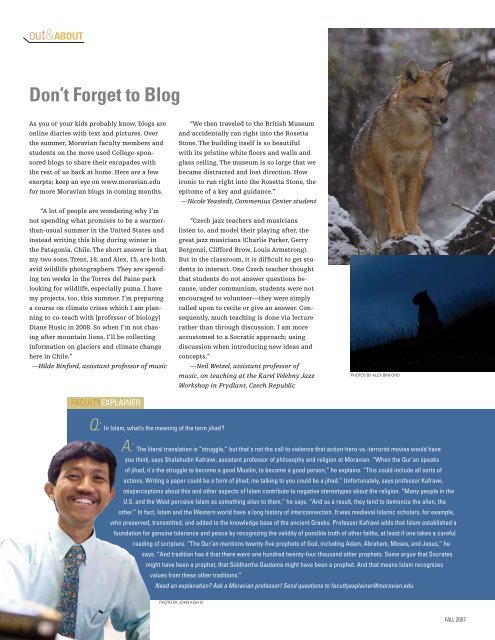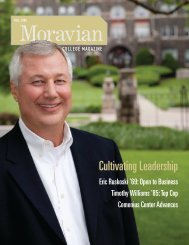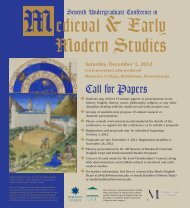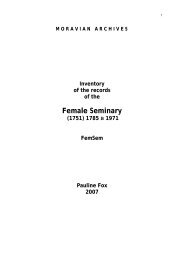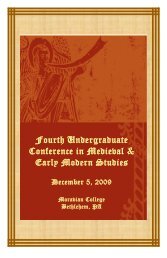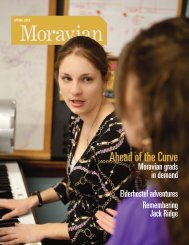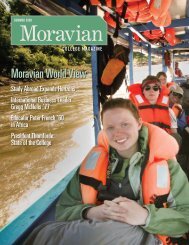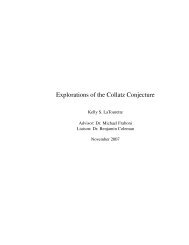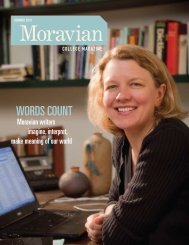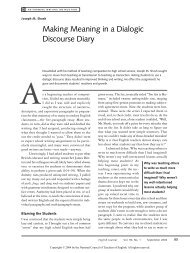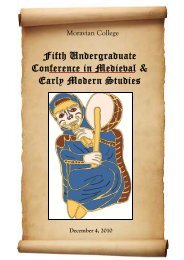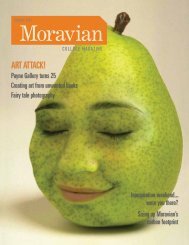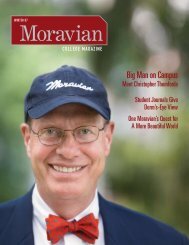Family Farms - Moravian College
Family Farms - Moravian College
Family Farms - Moravian College
You also want an ePaper? Increase the reach of your titles
YUMPU automatically turns print PDFs into web optimized ePapers that Google loves.
out&about<br />
Don’t Forget to Blog<br />
As you or your kids probably know, blogs are<br />
online diaries with text and pictures. over<br />
the summer, <strong>Moravian</strong> faculty members and<br />
students on the move used <strong>College</strong>-sponsored<br />
blogs to share their escapades with<br />
the rest of us back at home. Here are a few<br />
exerpts; keep an eye on www.moravian.edu<br />
for more <strong>Moravian</strong> blogs in coming months.<br />
“A lot of people are wondering why I’m<br />
not spending what promises to be a warmerthan-usual<br />
summer in the United States and<br />
instead writing this blog during winter in<br />
the Patagonia, Chile. The short answer is that<br />
my two sons, Trent, 18, and Alex, 15, are both<br />
avid wildlife photographers. They are spending<br />
ten weeks in the Torres del Paine park<br />
looking for wildlife, especially puma. I have<br />
my projects, too, this summer. I’m preparing<br />
a course on climate crises which I am planning<br />
to co-teach with [professor of biology]<br />
Diane Husic in 2008. So when I’m not chasing<br />
after mountain lions, I’ll be collecting<br />
information on glaciers and climate change<br />
here in Chile.”<br />
—Hilde Binford, assistant professor of music<br />
FACuLTYExPLAINEr<br />
“We then traveled to the British Museum<br />
and accidentally ran right into the Rosetta<br />
Stone. The building itself is so beautiful<br />
with its pristine white floors and walls and<br />
glass ceiling. The museum is so large that we<br />
became distracted and lost direction. How<br />
ironic to run right into the Rosetta Stone, the<br />
epitome of a key and guidance.”<br />
—Nicole Yeastedt, Commenius Center student<br />
“Czech jazz teachers and musicians<br />
listen to, and model their playing after, the<br />
great jazz musicians (Charlie Parker, Gerry<br />
Bergonzi, Clifford Brow, Louis Armstrong).<br />
But in the classroom, it is difficult to get students<br />
to interact. one Czech teacher thought<br />
that students do not answer questions because,<br />
under communism, students were not<br />
encouraged to volunteer—they were simply<br />
called upon to recite or give an answer. Consequently,<br />
much teaching is done via lecture<br />
rather than through discussion. I am more<br />
accustomed to a Socratic approach; using<br />
discussion when introducing new ideas and<br />
concepts.”<br />
—Neil Wetzel, assistant professor of<br />
music, on teaching at the Karel Velebny Jazz<br />
Workshop in Frydlant, Czech Republic<br />
Q: In Islam, what’s the meaning of the term jihad ?<br />
A: The literal translation is “struggle,“ but that's not the call to violence that action-hero-vs.-terrorist movies would have<br />
you think, says shalahudin Kafrawi, assistant professor of philosophy and religion at moravian. “when the Qur’an speaks<br />
of jihad, it's the struggle to become a good muslim, to become a good person,” he explains. “This could include all sorts of<br />
actions. writing a paper could be a form of jihad; me talking to you could be a jihad.” unfortunately, says professor Kafrawi,<br />
misperceptions about this and other aspects of Islam contribute to negative stereotypes about the religion. “many people in the<br />
u.s. and the west perceive Islam as something alien to them,” he says. “And as a result, they tend to demonize the alien, the<br />
other.” In fact, Islam and the western world have a long history of interconnection. It was medieval Islamic scholars, for example,<br />
who preserved, transmitted, and added to the knowledge base of the ancient Greeks. Professor Kafrawi adds that Islam established a<br />
foundation for genuine tolerance and peace by recognizing the validity of possible truth of other faiths, at least if one takes a careful<br />
reading of scripture. “The Qur’an mentions twenty-five prophets of God, including Adam, Abraham, moses, and Jesus,” he<br />
says. “And tradition has it that there were one hundred twenty-four thousand other prophets. some argue that socrates<br />
might have been a prophet, that siddhartha Gautama might have been a prophet. And that means Islam recognizes<br />
values from these other traditions.”<br />
need an explanation? ask a <strong>Moravian</strong> professor! send questions to facultyexplainer@moravian.edu.<br />
photo By John kish iv<br />
photos By alex Binford<br />
MORAVIAN COLLEGE MAGAZINE FALL 2007<br />
photo By doMinGa Baez


